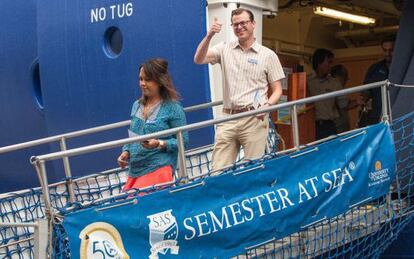More than 600 American students arrive in Cuba on a university trip
Havana is the last leg on the itinerary for University of Virginia’s Summer at Sea program


The cruise ship M. V. Explorer reached port in Havana this weekend carrying 624 students from 248 American universities abroad. These travelers are part of an exchange program, and their activities in Cuba will include conferences and excursions around the island.
Cuba and the United States broke off full diplomatic relations in 1961, and since then Americans who travel to the island must first secure authorization from the US government. Explorer began making these trips in 1999 and it has visited the island 10 times. The ship had to cancel its stops on the largest island in the Antilles in 2004 because of George W. Bush’s sanctions against the Communist government. Last year, the ship’s license was renewed and it returned to Havana after a three-year absence.
Explorer’s visits respond to both countries’ interest in opening up bilateral channels, mainly in the academic, cultural and religious fields. The ship, which will set sail for the United States on Wednesday, arrived in the Cuban capital from Barbados on Saturday. The trip is part of the University of Virginia’s Summer at Sea program, which allows American students to travel around the world accompanied by professors and administrators.
President Frank González of the University of Havana, the host institution, welcomed the expedition. According to the news agency EFE, the students told local media that they were “very happy” to visit Cuba, a country about which “much is said though little is known.” Havana is the last stop on their maritime semester, which began in London. The group visited 18 cities in various countries, including Russia and Brazil.
The Barack Obama administration’s flexibility also meant removing hindrances such as restrictions on travel and remittances for Cuban Americans who want to visit or send money to family members on the island. But the US government has kept up its travel ban for other American citizens, some of whom often disguise their trips to the island as “cultural” programs.
Some agencies choose the religious route but all travel programs must be associated with officially recognized religious or cultural institutions. In both cases, the travelers engage in some activities related to their stated purpose on the island by attending conferences, cultural events or visiting tobacco factories. Still, most of their trip is spent on tourism or other interests.
Translation: Dyane Jean François
Tu suscripción se está usando en otro dispositivo
¿Quieres añadir otro usuario a tu suscripción?
Si continúas leyendo en este dispositivo, no se podrá leer en el otro.
FlechaTu suscripción se está usando en otro dispositivo y solo puedes acceder a EL PAÍS desde un dispositivo a la vez.
Si quieres compartir tu cuenta, cambia tu suscripción a la modalidad Premium, así podrás añadir otro usuario. Cada uno accederá con su propia cuenta de email, lo que os permitirá personalizar vuestra experiencia en EL PAÍS.
¿Tienes una suscripción de empresa? Accede aquí para contratar más cuentas.
En el caso de no saber quién está usando tu cuenta, te recomendamos cambiar tu contraseña aquí.
Si decides continuar compartiendo tu cuenta, este mensaje se mostrará en tu dispositivo y en el de la otra persona que está usando tu cuenta de forma indefinida, afectando a tu experiencia de lectura. Puedes consultar aquí los términos y condiciones de la suscripción digital.








































